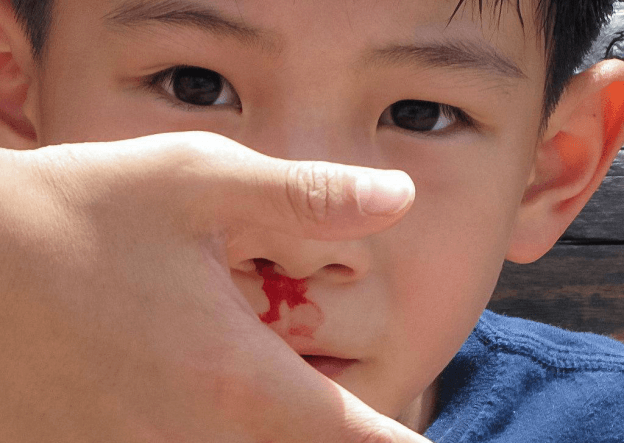
Nosebleed, the common name for Epistaxis, is a common occurrence in children. Most nosebleeds are not serious, and are usually caused by harsh blowing, picking, or an injury. Broadly classifying, there are two types of nosebleeds: anterior and posterior. Anterior nosebleeds are more common and self-heal without any medical intervention. Posterior nosebleed, however, calls for medical attention. Exploring the subject further, in this post, we discuss the causes of nosebleed and possible treatment options for children.

Causes
Apart from nose picking, blowing, and an injury, some other reasons of nose bleeding are:
- Overly sensitive blood vessels, which could burst or bleed in dry and warm weather
- Common cold and flu
- Infection in nose, throat, and sinuses
- Hay fever or dust mite allergy
- Nasal spray, anti-inflammatory medicine, and certain other medications
First-Aid
It is normal for the child to be upset and worried by the sight and taste of blood during the nosebleed. Parents or caretakers should help the child stay calm and reassure that there is nothing to worry about. The reason is that crying may increase the bleeding, making it more difficult to control the flow. Here is what needs to be done.
- Make the child sit upright and lean slightly forward
- Squeeze the lower part of the front of the nose
- Press the nostrils with a cloth or tissue
- Apply an icepack or wet cloth on the bridge of the nose
In addition, ask the child to spit out the blood dripped from nose to mouth. If the child swallows blood, it may cause vomiting, which may increase the bleeding.
When to See a Doctor?
If first-aid doesn’t provide relief or there are repeated episodes of nosebleed, it is advisable to consult a an ENT specialist. Take the child to the doctor if:
- There’s additional bleeding from other parts of the body such as in stool or urine
- Bleeding doesn’t stop after 20 minutes
- Child feels light-headed or dizzy
- Child has rapid heartbeat or trouble in breathing
- Child is vomiting blood
- Child has rash or temperature of more than 101.4 F
Must Read: Common Nosebleeds: Causes and Treatment Options
Last Few Words
Although nosebleed is not a serious medical condition, if the bleeding is uncontrolled or occurs too frequently, it is strongly advisable to consult an ENT expert. Houston Advanced Nose and Sinus has fellowship trained nose and sinus specialist, Dr. Kuperan who is committed to providing superlative care and the most effective treatment to patients troubled by ENT disorders. Call us at 713-791-0700 to schedule a consultation and rest assured you will be in safe hands. You can also fill out our contact form and one of our representatives will get back to you, shortly.
(Image credits: Creative Commons)

